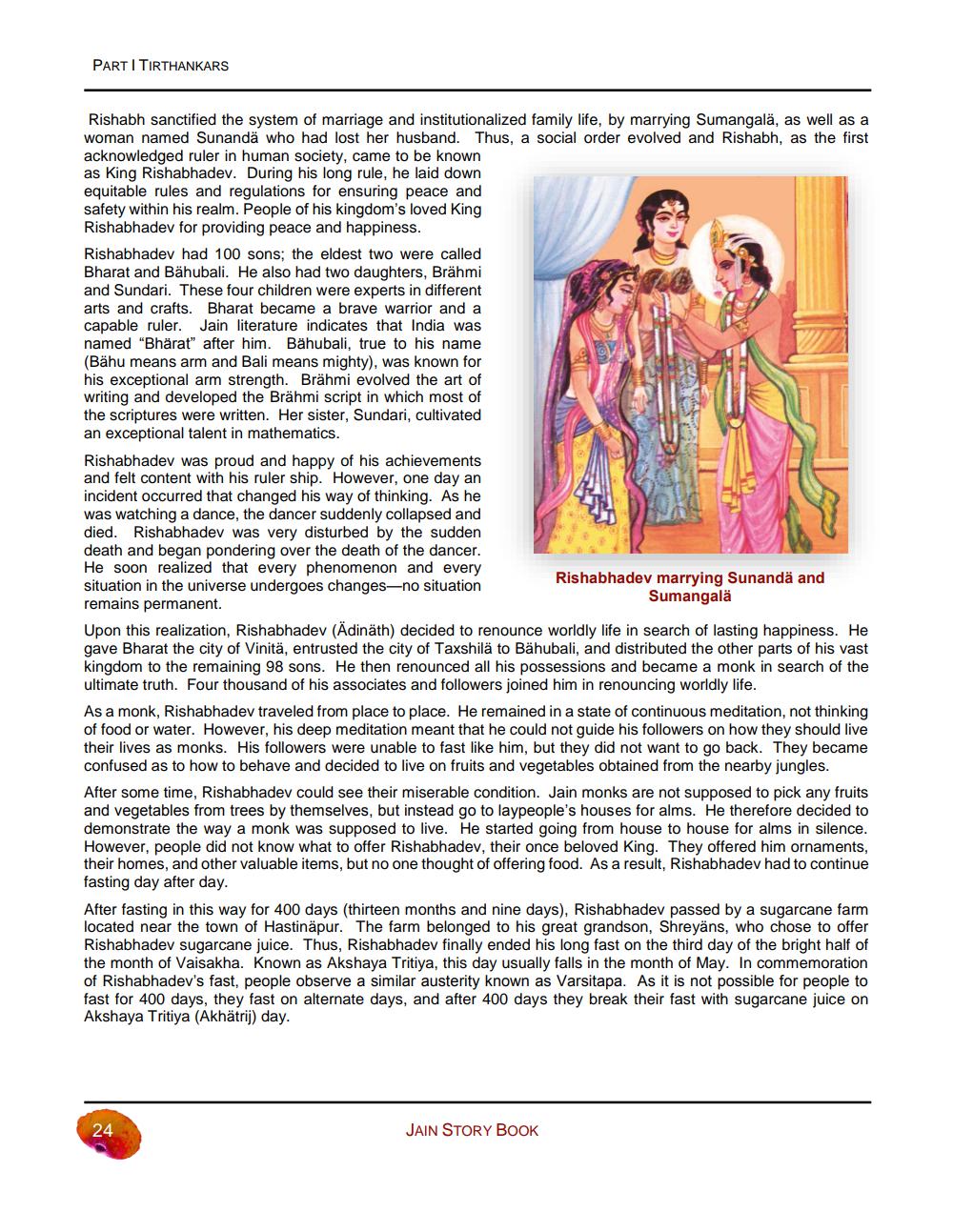________________
PART I TIRTHANKARS
Rishabh sanctified the system of marriage and institutionalized family life, by marrying Sumangalä, as well as a woman named Sunanda who had lost her husband. Thus, a social order evolved and Rishabh, as the first acknowledged ruler in human society, came to be known as King Rishabhadev. During his long rule, he laid down equitable rules and regulations for ensuring peace and safety within his realm. People of his kingdom's loved King Rishabhadev for providing peace and happiness.
Rishabhadev had 100 sons; the eldest two were called Bharat and Bähubali. He also had two daughters, Brähmi and Sundari. These four children were experts in different arts and crafts. Bharat became a brave warrior and a capable ruler. Jain literature indicates that India was named "Bhärat" after him. Bähubali, true to his name (Bähu means arm and Bali means mighty), was known for his exceptional arm strength. Brähmi evolved the art of writing and developed the Brähmi script in which most of the scriptures were written. Her sister, Sundari, cultivated an exceptional talent in mathematics.
Rishabhadev was proud and happy of his achievements and felt content with his ruler ship. However, one day an incident occurred that changed his way of thinking. As he was watching a dance, the dancer suddenly collapsed and died. Rishabhadev was very disturbed by the sudden death and began pondering over the death of the dancer. He soon realized that every phenomenon and every situation in the universe undergoes changes-no situation remains permanent.
Upon this realization, Rishabhadev (Ädinäth) decided to renounce worldly life in search of lasting happiness. He gave Bharat the city of Vinitä, entrusted the city of Taxshilä to Bähubali, and distributed the other parts of his vast kingdom to the remaining 98 sons. He then renounced all his possessions and became a monk in search of the ultimate truth. Four thousand of his associates and followers joined him in renouncing worldly life.
Rishabhadev marrying Sunandä and Sumangalä
As a monk, Rishabhadev traveled from place to place. He remained in a state of continuous meditation, not thinking of food or water. However, his deep meditation meant that he could not guide his followers on how they should live their lives as monks. His followers were unable to fast like him, but they did not want to go back. They became confused as to how to behave and decided to live on fruits and vegetables obtained from the nearby jungles.
After some time, Rishabhadev could see their miserable condition. Jain monks are not supposed to pick any fruits and vegetables from trees by themselves, but instead go to laypeople's houses for alms. He therefore decided to demonstrate the way a monk was supposed to live. He started going from house to house for alms in silence. However, people did not know what to offer Rishabhadev, their once beloved King. They offered him ornaments, their homes, and other valuable items, but no one thought of offering food. As a result, Rishabhadev had to continue fasting day after day.
After fasting in this way for 400 days (thirteen months and nine days), Rishabhadev passed by a sugarcane farm located near the town of Hastinäpur. The farm belonged to his great grandson, Shreyäns, who chose to offer Rishabhadev sugarcane juice. Thus, Rishabhadev finally ended his long fast on the third day of the bright half of the month of Vaisakha. Known as Akshaya Tritiya, this day usually falls in the month of May. In commemoration of Rishabhadev's fast, people observe a similar austerity known as Varsitapa. As it is not possible for people to fast for 400 days, they fast on alternate days, and after 400 days they break their fast with sugarcane juice on Akshaya Tritiya (Akhätrij) day.
24
JAIN STORY BOOK




